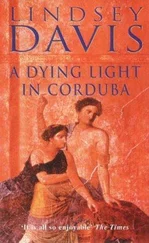Lindsey Davis - Enemies at Home
Здесь есть возможность читать онлайн «Lindsey Davis - Enemies at Home» весь текст электронной книги совершенно бесплатно (целиком полную версию без сокращений). В некоторых случаях можно слушать аудио, скачать через торрент в формате fb2 и присутствует краткое содержание. Жанр: Исторический детектив, на английском языке. Описание произведения, (предисловие) а так же отзывы посетителей доступны на портале библиотеки ЛибКат.
- Название:Enemies at Home
- Автор:
- Жанр:
- Год:неизвестен
- ISBN:нет данных
- Рейтинг книги:3 / 5. Голосов: 1
-
Избранное:Добавить в избранное
- Отзывы:
-
Ваша оценка:
- 60
- 1
- 2
- 3
- 4
- 5
Enemies at Home: краткое содержание, описание и аннотация
Предлагаем к чтению аннотацию, описание, краткое содержание или предисловие (зависит от того, что написал сам автор книги «Enemies at Home»). Если вы не нашли необходимую информацию о книге — напишите в комментариях, мы постараемся отыскать её.
Enemies at Home — читать онлайн бесплатно полную книгу (весь текст) целиком
Ниже представлен текст книги, разбитый по страницам. Система сохранения места последней прочитанной страницы, позволяет с удобством читать онлайн бесплатно книгу «Enemies at Home», без необходимости каждый раз заново искать на чём Вы остановились. Поставьте закладку, и сможете в любой момент перейти на страницу, на которой закончили чтение.
Интервал:
Закладка:
Women have to be assigned a guardian when they have no husband, father or other obvious head of household. Some women are so much under their guardian’s control they marry them, others manage to bamboozle their so-called protectors. As I established when I took Faustus to meet my uncles, I would never have wanted one; I was not prepared to have anybody sign my contracts, speak for me legally or invest my capital. Mucia Lucilia had known Hermes since childhood. Perhaps, like so many women I would judge as dimwits, she just accepted the situation — or had she married to escape constraints, thinking Aviola would give her more freedom?
Everything may have been amicable. The picture Hermes gave me was that he and Mucia had enjoyed a friendly relationship and that he organised her affairs with a light hand. Certainly she liked him enough to have kept him as her executor, even when she re-wrote her will recently (which she had done on her marriage, like Aviola); at that time, she could easily have dropped Hermes. If she was nervous about dismissing him, she could always have said her husband made her change.
‘Would you call Mucia Lucilia a woman who knew her own mind, Hermes?’
‘Very much so.’
Not the nervous type then. This was the first I had heard of Mucia being strong-willed. ‘Was she domineering?’
‘Oh no. There was never unpleasantness. Mucia Lucilia got her way very diplomatically … But she had firm opinions and was quick to act when the mood took her.’
‘With Aviola?’
‘With anyone. But being contentious was rare; it was just not her way.’
I insisted on being sure; this was important. ‘Nobody thought of her as tyrannical? She was well liked?’
‘Very much so,’ said Hermes again. I would have left it — had he not added, ‘ — by most people.’
I pricked up my ears. ‘Who disliked her?’ Apparently Hermes failed to hear the question.
Pretending to change the subject I asked what might seem an innocuous question: ‘This probably has no bearing, but if their plans had worked out better, the two victims would never have been at the apartment when the thieves broke in … Do you happen to know why they could not leave for Campania straight after their wedding?’ The freedman leaned back on his stool and said nothing. His silence screamed at me to persist. ‘Hermes, they wanted to go the day before. What stopped them?’
‘ Who, you mean,’ Hermes said. He pursed his lips, then gave up the answer. ‘Valerius Aviola had been letting someone use his villa. The guest failed to vacate the house when requested — that was why he sent so many slaves on ahead. I believe they had orders to assist with the guest’s packing − by force if necessary. Mucia Lucilia was not prepared to share the accommodation.’
‘Ah!’ So Mucia was firmly putting her foot down — only one day into her marriage. ‘Who was this unwanted guest? And why were they being difficult?’
‘On why, I cannot comment,’ returned the freedman primly, indicating the reason was not favourable to the sticking limpet. ‘I can certainly tell you who she is.’
She ? The discovery that Mucia Lucilia refused to share the villa with another woman was intriguing. Had Valerius Aviola kept some long-term mistress secreted away in the country? … I guessed Hermes was about to reveal his wild theory, the one Sextus Simplicius had not wished me to hear, in case I believed it. Normally I have no time for other people’s crazy thoughts. I like to invent any mad theories for myself — and then discount them.
Hermes flushed red with real anger: ‘She was digging her heels in, refusing to go. She was malicious, it was unacceptable, my mistress was adamant and nobody blames her. Flavia Albia, the household slaves had nothing to do with what happened. I can tell you exactly who wanted Aviola and my dear young mistress dead. They thwarted her and she wouldn’t take it. She wanted Aviola’s villa and to get it, she arranged to have them murdered.’
This must be an amazing villa. ‘But, Hermes, who is she?’
‘The most jealous, manipulative, evil, scheming woman you will ever meet — his wife!’
14
Diana Aventina!
That blew everything apart. All previous theories had to be reassessed.
Disappointingly, it turned out that Aviola had not been a bigamist. He had been previously married but divorced.
Hermes erupted into an outburst where he claimed the ex-wife was a schemer who had sworn Aviola would not get away with his remarriage. From the moment it was announced, she tried to poison him against his new bride. She was famously vindictive and would stop at nothing, even murder.
I downplayed all this. Alleged evil scheming needed to be thought about later, in private. Damaging someone’s reputation unfairly carries a high premium in Rome, even if you are right to defame them. The worse a person is, the more likely they are to demand compensation and the higher their claim. I knew my legal uncles would advise restraint.
Cautiously, I prised out the facts. Galla Simplicia had married Valerius Aviola in their youth, a marriage that lasted long enough to produce three children. They divorced way back, yet remained in contact because of those children. Young at the time of the split, they were brought up by their mother; she received money for their maintenance and had grown rather too used to this income. She had property of her own but particularly liked Aviola’s handsome and comfortable Campanian villa, where until now she had been allowed to visit, using the excuse that she was taking the children to their family’s holiday home.
‘How old are they now?’
‘All in their twenties.’
‘So maintenance payments to their mother ought to have stopped anyway!’ I bet the new wife had pointed that out to Aviola.
Hermes said there had never been any question that, as Galla Simplicia now claimed, Aviola had gifted the villa to her. It was well known in their circle that it was his own favourite house. He went down there every summer, and it was natural he would want to take a new wife soon after their wedding. Hermes told me (as Sextus Simplicius had not) that this villa specifically formed part of the bequest from Aviola to Mucia Lucilia in his new will. If he died, he intended that the second wife should have it.
I wondered what his previous will had said. Clearly Galla Simplicia would have angled for it. But possibly the villa had been assigned to the children — and probably they would acquire it now.
I could see exactly why Mucia Lucilia had refused to share the place with Galla Simplicia. I would have done the same. Mucia needed to take charge.
I guessed how sourly Mucia must have viewed the heavily entrenched ex-wife, together with Aviola’s now grown-up children. Anyone could guess how much those children must be under their mother’s influence.
But there was a reverse slant. Aviola’s new marriage, after so many years of easy coexistence, would have destabilised the ex-wife’s position. Since they divorced so long before, this change may have surprised her, caught her out. An extreme reaction might have occurred, just as Hermes claimed — yet was it likely?
‘She and Aviola had a screaming row. She tried to bully him, using her children.’ Hermes flushed scarlet with indignation again, even to his outstanding ears.
‘What are the children like?’ Spoiled brats, or I was losing my touch.
‘Ghastly,’ he snapped back. As I thought. ‘Expecting to sponge off their father for life.’
‘Boys? Girls?’
‘Useless boy, two insipid girls. Galla was terrified their father would lose interest, especially if Mucia Lucilia were to bear children who might supplant hers.’
Читать дальшеИнтервал:
Закладка:
Похожие книги на «Enemies at Home»
Представляем Вашему вниманию похожие книги на «Enemies at Home» списком для выбора. Мы отобрали схожую по названию и смыслу литературу в надежде предоставить читателям больше вариантов отыскать новые, интересные, ещё непрочитанные произведения.
Обсуждение, отзывы о книге «Enemies at Home» и просто собственные мнения читателей. Оставьте ваши комментарии, напишите, что Вы думаете о произведении, его смысле или главных героях. Укажите что конкретно понравилось, а что нет, и почему Вы так считаете.












